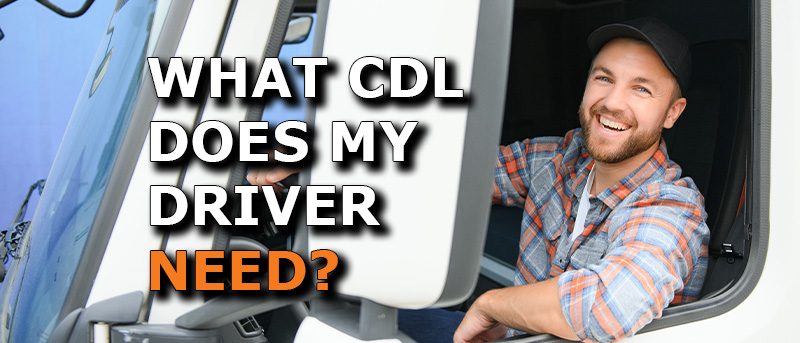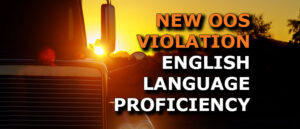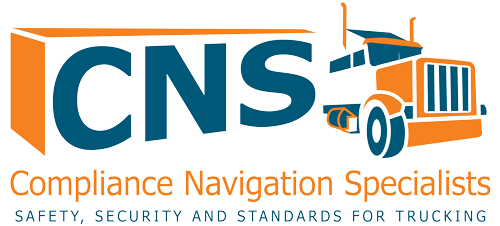A Complete Guide to CDL Endorsements and Restrictions for Non-Trucking Companies

Hiring in 2026? Make sure you’re hiring qualified drivers who have all the right licensure and endorsements to operate your company’s vehicles.
If your company relies on drivers — even though trucking isn’t your main business — understanding Commercial Driver’s Licenses (CDLs) and endorsements is crucial.
Whether your employees drive dump trucks, box trucks, passenger vans, or vehicles hauling hazardous materials, having the right class of CDL and proper endorsements ensures you stay compliant, protect your insurance coverage, and avoid costly FMCSA or state penalties.
Let’s break down what businesses need to know when hiring drivers in 2026.
Understanding CDL Classes
A CDL isn’t one-size-fits-all. There are three main classes — A, B, and C — each tied to the size and type of vehicle being operated.
Here’s a quick breakdown:
Class A CDL
- Required for: Tractor-trailers, combination vehicles, and any rig with a Gross Combination Weight Rating (GCWR) of 26,001 lbs or more, towing a trailer over 10,000 lbs.
- Common examples: Semi-trucks, flatbeds, tanker combinations, and truck-trailer combos.
- Typical employers: Logistics, equipment transport, or heavy construction firms hauling machinery.
Class B CDL
- Required for: Single vehicles over 26,001 lbs GCWR, or towing a trailer under 10,000 lbs.
- Common examples: Dump trucks, concrete mixers, straight trucks, box trucks, and buses.
- Typical employers: Construction, landscaping, waste management, and local delivery services.
Class C CDL
- Required for: Vehicles that don’t fit Class A or B but are designed to:
- Transport 16 or more passengers (including the driver), or
- Carry hazardous materials requiring placards.
- Common examples: Passenger vans, small hazmat trucks, or medical waste haulers.
- Typical employers: Municipal fleets, schools, and specialty service providers.
Key CDL Endorsements to Look For
Endorsements expand what types of vehicles or freight a driver can legally operate. They’re added to a CDL after passing additional written and/or skills tests.
Here are the most common ones employers should understand:
| Endorsement | Code | Description | Required For |
| Hazardous Materials | H | Allows transport of hazardous materials | Tankers, fuel trucks, chemical transport |
| Tank Vehicle | N | For vehicles carrying liquid or gas in bulk | Water, fuel, or septic trucks |
| Passenger | P | For transporting 16+ passengers (including driver) | Shuttle or tour buses |
| School Bus | S | For operating a school bus | Schools or private education transport |
| Double/Triple Trailers | T | For pulling two or three trailers | Specialized freight operations |
| Combination (Tank + Hazmat) | X | Combines N + H | Fuel tankers and other hazmat tank vehicles |
Tip for Employers: If your fleet hauls fuel, chemicals, or other hazardous materials — or even uses bulk liquid tanks — drivers must hold the correct endorsement before they operate the vehicle. Otherwise, your company could face liability and FMCSA fines.
Common CDL Restrictions to Watch Out For
Restrictions limit what a driver can operate. These are usually added if the driver tested on a vehicle missing certain systems or features.
| Restriction | Code | Meaning | How It Affects You |
| Automatic Transmission Only | E | Driver tested in automatic — can’t drive manual | Common issue if your fleet uses manual transmissions |
| No Air Brakes | L or Z | Driver didn’t test on a vehicle with full air brakes | Critical if you operate heavy trucks or buses |
| Passenger Vehicle Limitations | M or N | Driver tested in smaller vehicle — limited to smaller passenger types | Impacts school or shuttle operations |
| Medical Variance | V | Indicates a medical condition requiring monitoring | Review before placing driver in safety-sensitive roles |
Hiring Drivers: Tips for Non-Trucking Companies
If your company isn’t a full-fledged motor carrier, it’s easy to overlook the complexity of CDL hiring. But even a single truck or passenger vehicle can make you subject to FMCSA and state DOT rules. Here’s how to protect your business:
- Know What CDL Class Your Vehicles Require
Before posting a job ad, confirm whether your company vehicles fall under Class A, B, or C. - Verify Licenses and Endorsements Early
Don’t just take a photocopy of a CDL — verify its status through your state’s DMV or FMCSA systems. CNS can help manage this step through digital driver qualification file reviews. - Screen for Restrictions
Ensure the driver doesn’t have limitations preventing them from legally operating your vehicle (like “no air brakes” when your trucks have them). - Review Medical Certification
CDL holders must maintain a valid DOT medical card. A lapse can invalidate their license and your company’s compliance. - Conduct a Full Pre-Employment Process
This includes MVR checks, drug/alcohol testing, previous employment verification, and motor carrier safety performance history — all required under 49 CFR Part 391. - Train and Monitor Continuously
Even small fleets need a driver file management system to track license renewals, medical cards, and annual reviews.
How CNS Helps You Hire the Right Drivers
At Compliance Navigation Specialists (CNS), we understand that compliance can be overwhelming — especially for companies that don’t identify as trucking businesses but still depend on commercial drivers.
Our team makes the hiring process simple and compliant:
- Driver Qualification File (DQF) Management — We build, audit, and maintain compliant driver files.
- Pre-Employment Screening — License checks, drug/alcohol testing, employment verifications, and background checks.
- Ongoing Monitoring — We track CDL renewals, medical card expirations, and driver violations.
- Compliance Consulting — Guidance on what CDL class or endorsement your drivers need.
- ELDT Training Support — If your driver is earning a CDL for the first time, we help meet all FMCSA Entry-Level Driver Training (ELDT) requirements.
Our goal is to keep your company compliant, your drivers qualified, and your operations running smoothly — without the headache of managing DOT rules alone.
Ready to Simplify Hiring and Compliance?
Let CNS handle the regulatory side so you can focus on growing your business.
Contact our team today to review your hiring process and ensure your drivers have the right CDL and endorsements for your fleet.
Questions about DOT Compliance, Licensing, Audits, Programs, etc.?
Our DOT Specialists are here to help!
What are you searching for?
Is DOT Compliance your Top Priority?
Our DOT Compliance Programs ensure it is your top priority and keeps your business running.
Related Services
Subscribe to our Monthly Newsletter
Receive the latest transportation and trucking industry information about FMCSA and DOT Audits, Regulations, etc.
Related news
Trucking News
Get the latest trucking news on DOT Compliance, Licensing, Audits, and more!

DOT SAP Program Explained (2026 Guide)
Requirements, Timeline, Costs, and What Drivers Need to Know Drug and alcohol violations remain one of the fastest ways for CDL drivers to be removed

New Law Codifies English Language Proficiency as an Out-of-Service Violation
On February 4, 2026, President Trump signed into law a federal funding bill that not only ended a partial government shutdown but also delivered several

Paper Medical Cards Still Valid: FMCSA Issues 60-Day NRII Transition Waiver for CDL Drivers
The Federal Motor Carrier Safety Administration (FMCSA) has issued a new waiver related to the National Registry II (NRII) medical certification process, extending temporary flexibility
